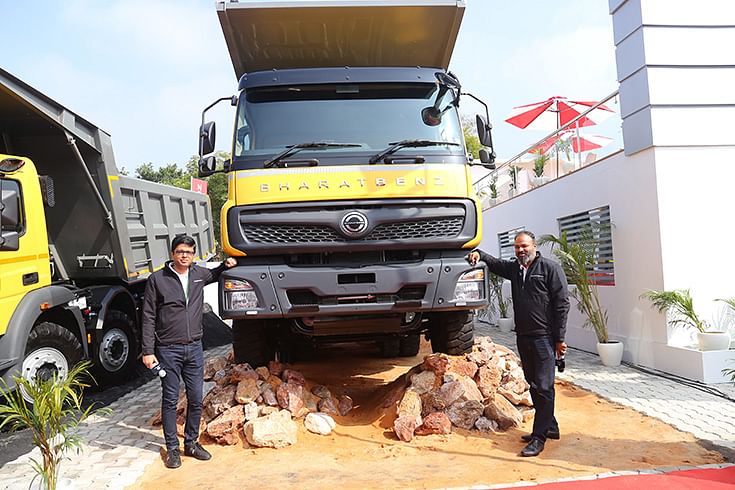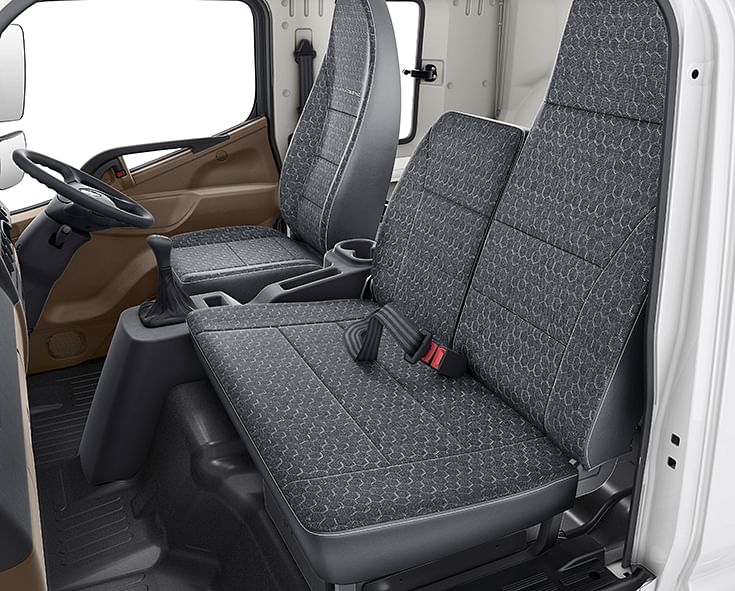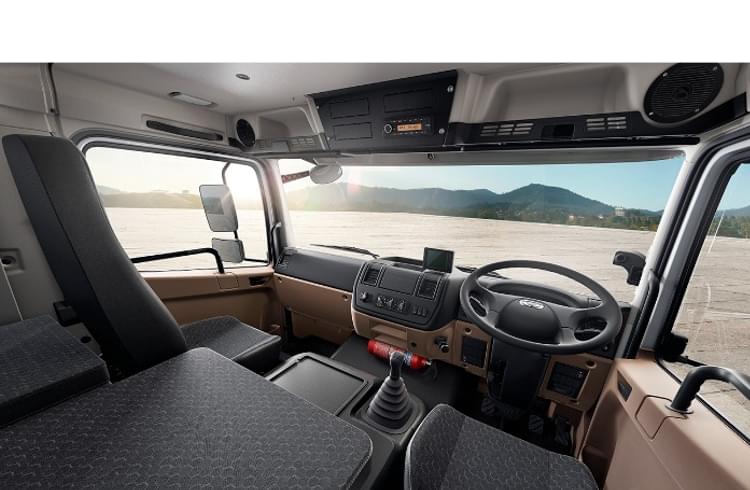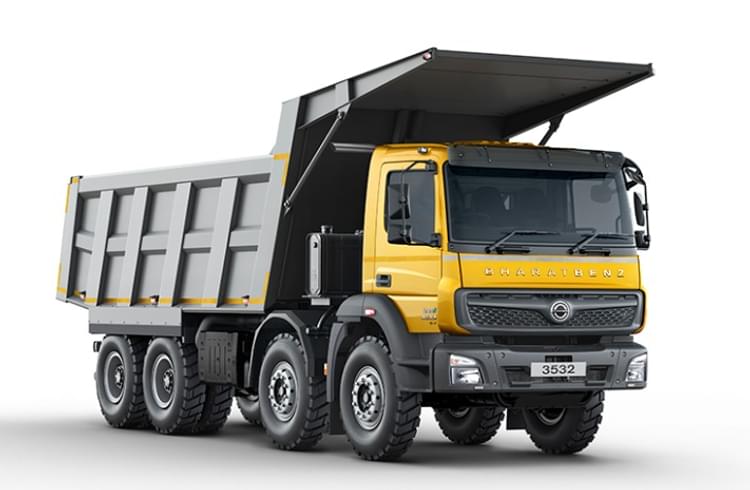DICV improves BharatBenz heavy-duty truck cabin safety to European norms
Daimler India CV has voluntarily upgraded the cabins of its heavy-duty mining and construction trucks to ECE R29-03 safety norms and a step ahead of AIS-029 in India; they ensure higher levels of driver safety and are mandatory in many European countries.
Daimler India Commercial Vehicles (DICV), which recently introduced its high-performance construction and mining trucks at the BAUMA Conexpo in Bengaluru in January 2023, has reinforced its commitment towards vehicle safety of its truck-and-bus offerings.
The Chennai-based company has voluntarily upgraded the cabins of its mining and construction trucks to ECE R29-03 safety standards, which are a step ahead of the AIS-029 norms prevalent in the country. While the move is driven by its intent to enhance driver and vehicle safety on Indian roads, it also enables the company to export its products to several markets in Europe, where heavy-duty trucks must comply with regulations equivalent to the ECE R29-03 standards.
What is the ECE R29-03 standard?
While an OEM must perform three crash tests – pendulum (for front or head-on collision), roof strength test, and rear-wall test (for payload) – under the AIS-029 cabin crash test standards, the upgraded norms include two additional tests – A-pillar test, and side-corner test – to ensure occupant safety during a rollover.
The ECE R29-03 standards also increase the loads applied for crushing the cabin during a crash test, whereas the A-pillar and side-corner test ensure structural integrity during a topple situation. While the AIS-029 crash test norms focus on the bottom half of the truck cabin, which is comprised of steel, the ECE R29-03 standards, are centered around the top half of the cabin which primarily houses glass and windshield, and thereby making it extremely difficult for OEMs to improve its strength.
DICV has upgraded the cabins on its newer trucks for ECE R29-03 compliance, in line with European regulations, and says the purpose of this exercise is to ensure higher levels of driver safety on the roads.

Speaking to Autocar Professional, Pradeep T, vice-president, Product Engineering, DICV, said: “Safety is a key parameter in our design philosophy and the new products meet the latest heavy-duty truck cabin crash norms, including roll-over protection. This is a major step forward in our commitment to providing our customers in the Indian market with advanced and reliable products. We will continue to bring a greater number of safety features in DICV products.”
“The compliance to ECE R29-03 norms is now a standard fitment across all our trucks as we wanted to offer a safer workplace to the driver on the road. The exercise was not driven by a cost or volume perspective. We focus a lot on the safety and comfort of the driver,” Pradeep T told Autocar Professional.
“The customer also sees value in the total cost of ownership as the higher acquisition cost of the truck minimises the risk of an accident due to driver fatigue. Every accident avoided on Indian roads is going to create immense value to the economy,” he highlighted.
Braking safety features in trucks
The updated DICV trucks, which are sold in India under the ‘BharatBenz’ brand name, are locally designed and developed at the company’s full-fledged R&D centre in Chennai, with support from Daimler’s global centres of excellence. The company reiterates that safety is its key priority and it will now introduce electronic stability control or ESC from April in DICV buses as part of the upcoming regulations.
“There are also discussions to implement autonomous emergency braking or AEB in trucks for which the regulations are currently in the draft stage, but it is expected to come in the high-speed truck-and-bus segment to significantly reduce the chance of accidents on Indian roads.
“There are two ways of offering safety technologies in vehicles. Firstly, one could be ahead of the regulations, and secondly, deliver more than what the standards demand. At DICV, we will choose what makes the most sense for our customers, as sometimes, being ahead of the regulations might not help either. So, based on the vehicle’s desired application, and its features, we will decide where we want to be ahead and where to be better than the regulations,” Pradeep T said.
 DICV’s research reveals that a number of truck drivers in India suffer from hearing disability due to continuous driving with their windows open. An air-conditioned cabin reduces NVH levels and also improves aerodynamics.
DICV’s research reveals that a number of truck drivers in India suffer from hearing disability due to continuous driving with their windows open. An air-conditioned cabin reduces NVH levels and also improves aerodynamics.
Over 50% DICV trucks sold with AC cabins
The company is also observing a marked increase in the offtake of AC-equipped truck cabins in India with over half of its demand coming for AC trucks. “Since we started operations more than 10 years ago, the offtake of AC cabins has been significantly increasing and today, the percentage of AC-equipped trucks that we sell is almost 50 percent of our total volumes. What we have observed is that there is a huge shift in the customer psyche as well.
“It is a myth that AC trucks consume more fuel. On the contrary, when the cabin window is rolled up, it improves the vehicle’s aerodynamics, and more importantly, ensures that the driver’s body temperature remains stable, which keeps the alertness level significantly high. While we have an option of AC across our entire portfolio, in some models, we sell AC-only trucks,” added Pradeep T.
DICV’s research has revealed that a number of truck drivers in India are found suffering from hearing disability, particularly on their right-side ears. Pradeep T explains that in most cases, drivers are driving continuously with their windows open for almost eight hours. “Therefore, with AC cabins, the NVH is less and since there is no wind blast, it helps keeping the driver’s health in a better shape,” he says.
While the company aims to consistently improve the safety of its products, DICV is also looking at introducing automatic transmission back into its trucks in the country, as an added feature for driver comfort, convenience, and lesser fatigue. “We do offer automatic transmissions in trucks that we export. While we had AMT in certain products on sale in India in the past, we will continue to bring such technologies to the Indian market,” he signed off. It will be a move much appreciated by scores of truck drivers, the unsung heroes of the Indian economy.
ALSO READ: Samvardhana Motherson eyes demand from off-highway vehicles, acquires cabin-making JV
RELATED ARTICLES
Cosmo First diversifies into paint protection film and ceramic coatings
The Aurangabad, Maharashtra-based packaging materials supplier is leveraging its competencies in plastic films and speci...
JSW MG Motor India confident of selling 1,000 M9 electric MPVs in first year
The 5.2-metre-long, seven-seater luxury electric MPV, which will be locally assembled at the Halol plant in Gujarat, wil...
Modern Automotives targets 25% CAGR in forged components by FY2031, diversifies into e-3Ws
The Tier-1 component supplier of forged components such as connecting rods, crankshafts, tie-rods, and fork bridges to l...






 21 Mar 2023
21 Mar 2023
 27716 Views
27716 Views












 Autocar Professional Bureau
Autocar Professional Bureau




